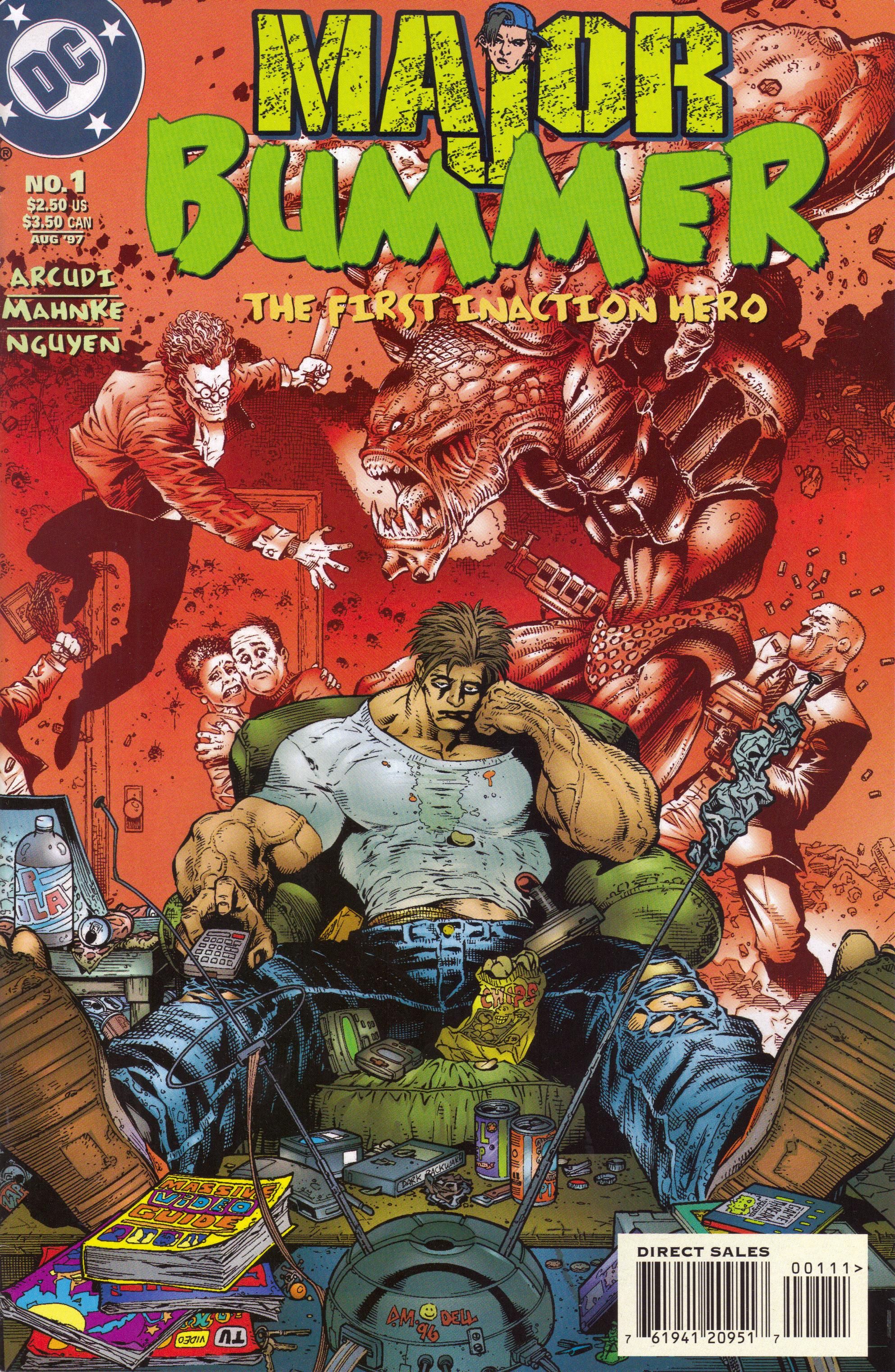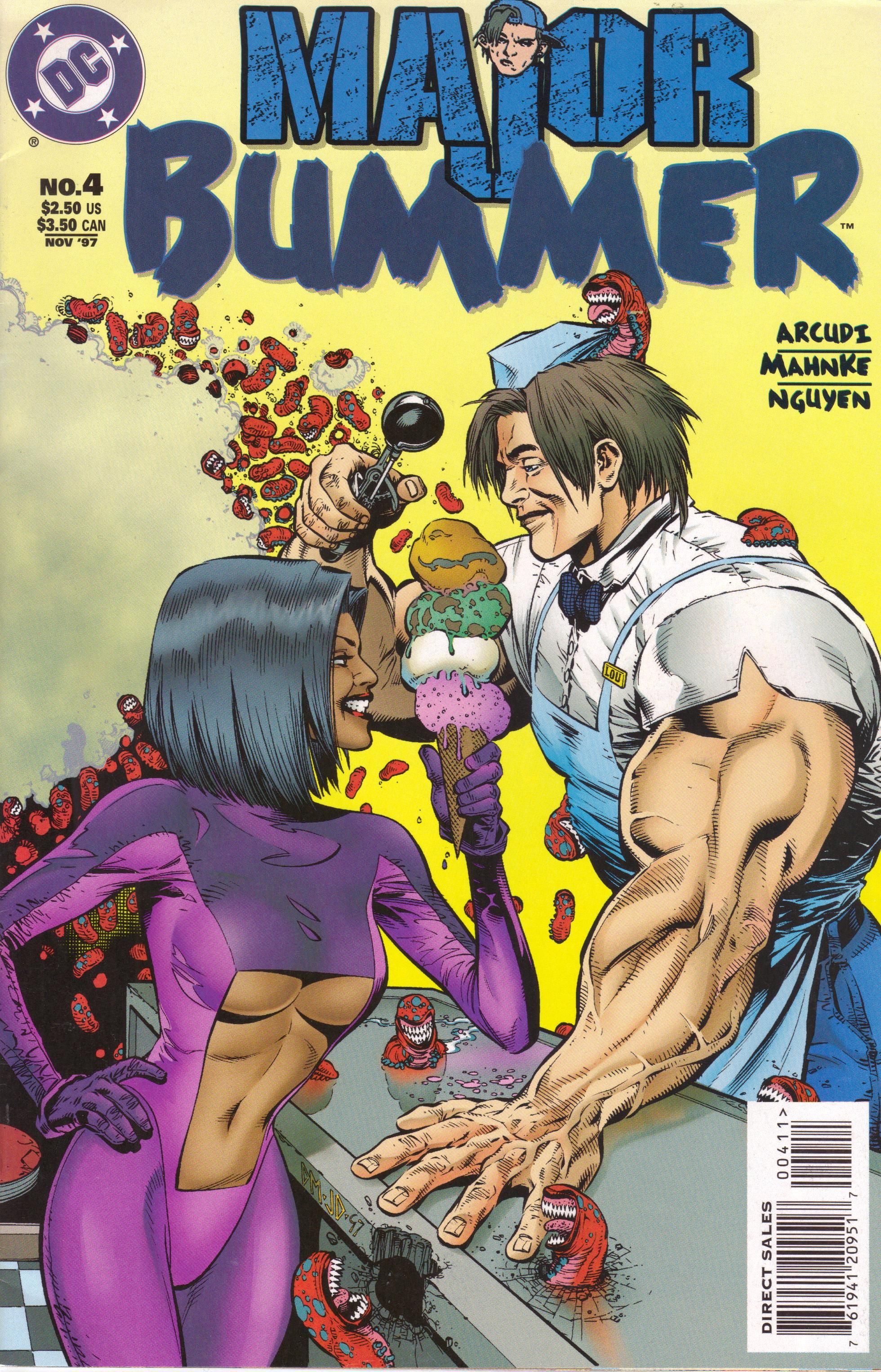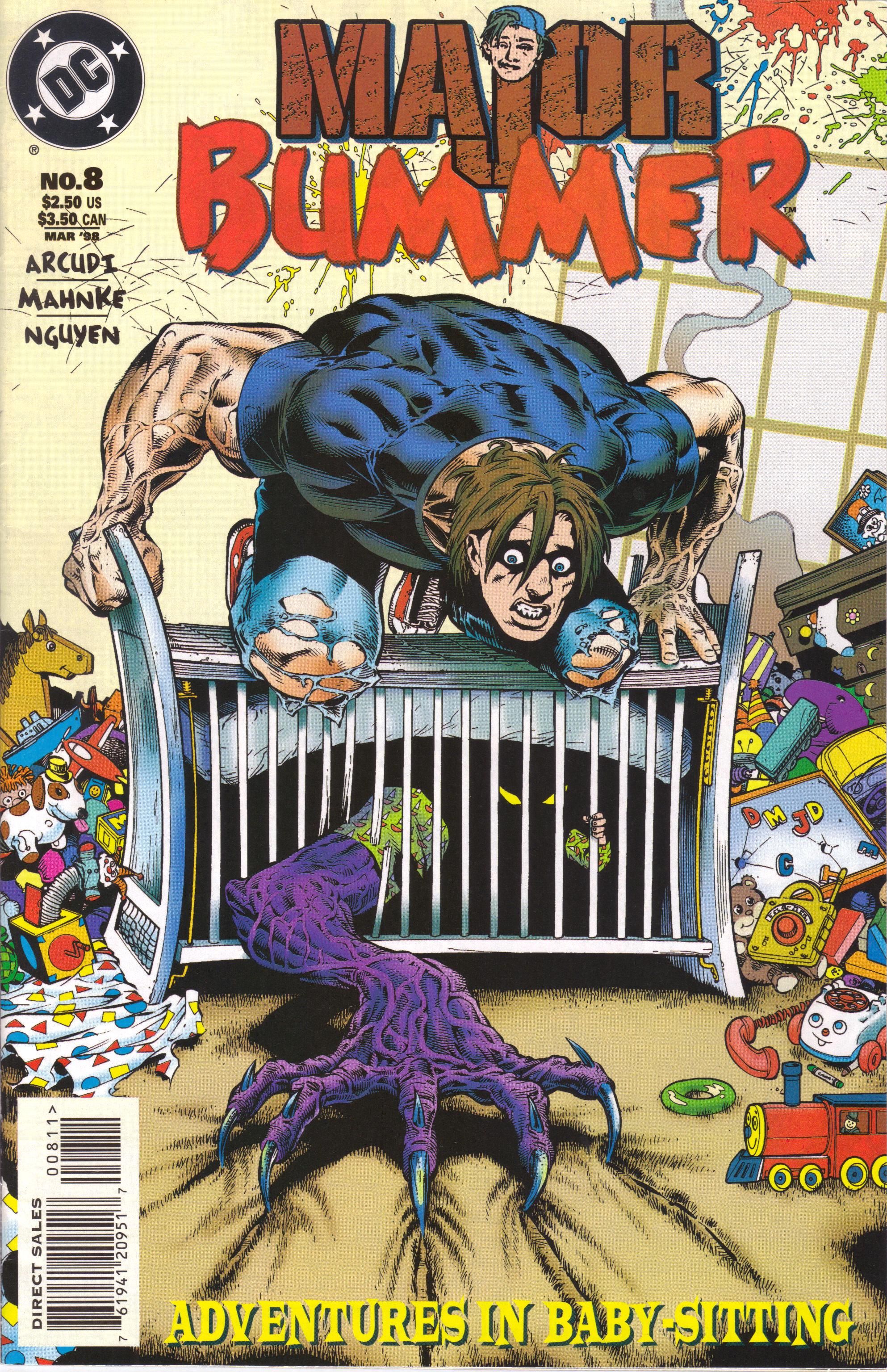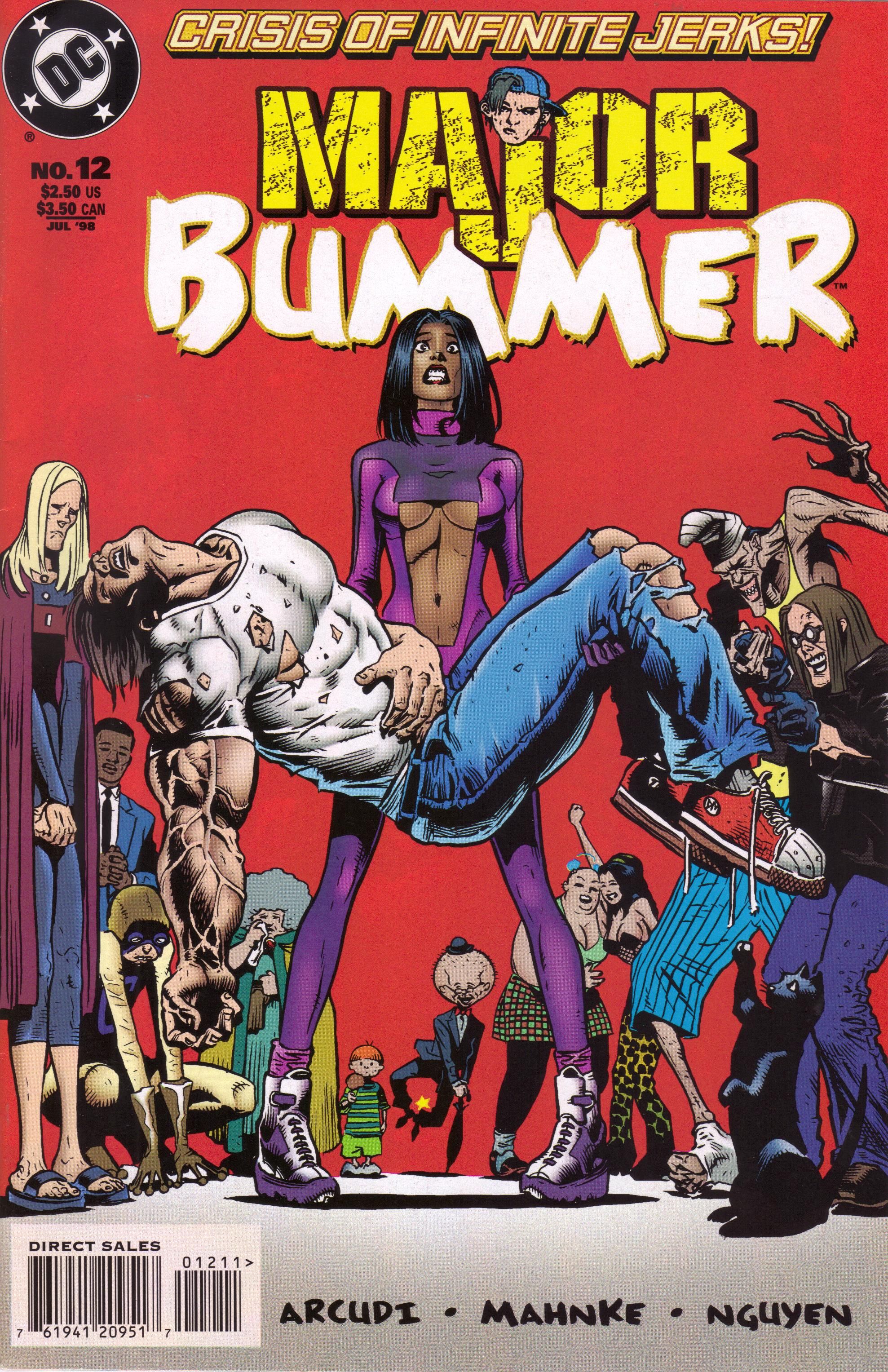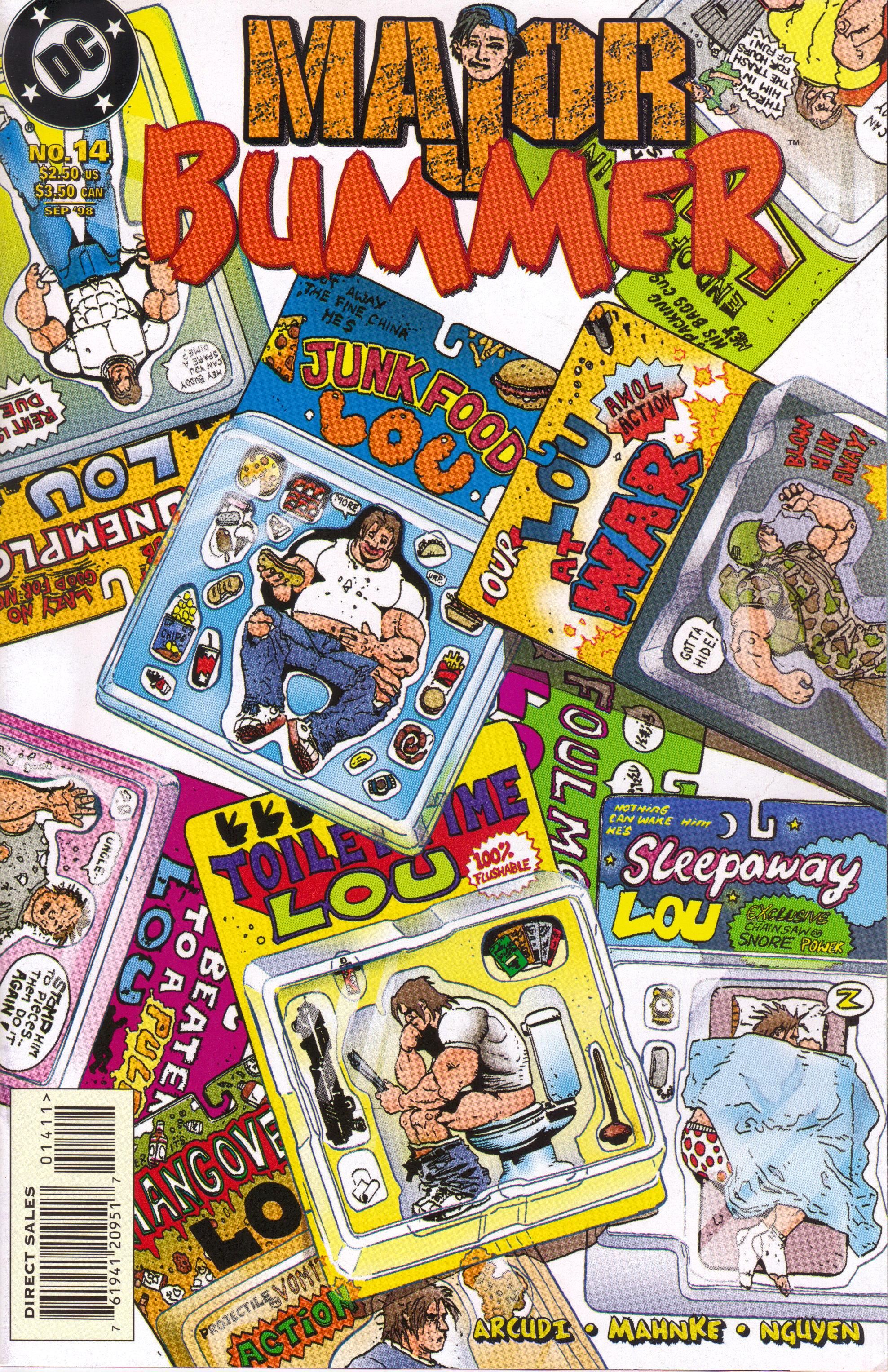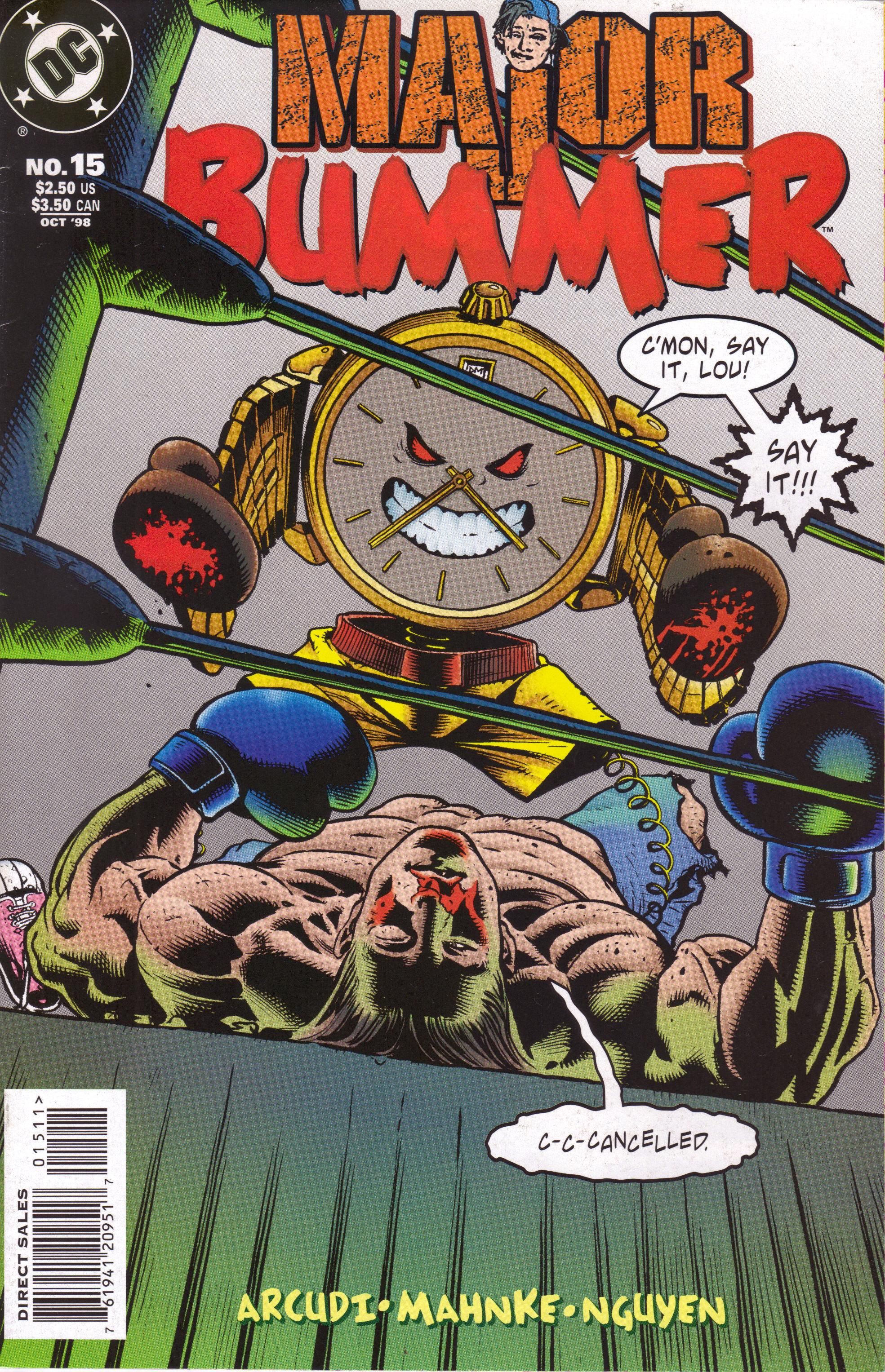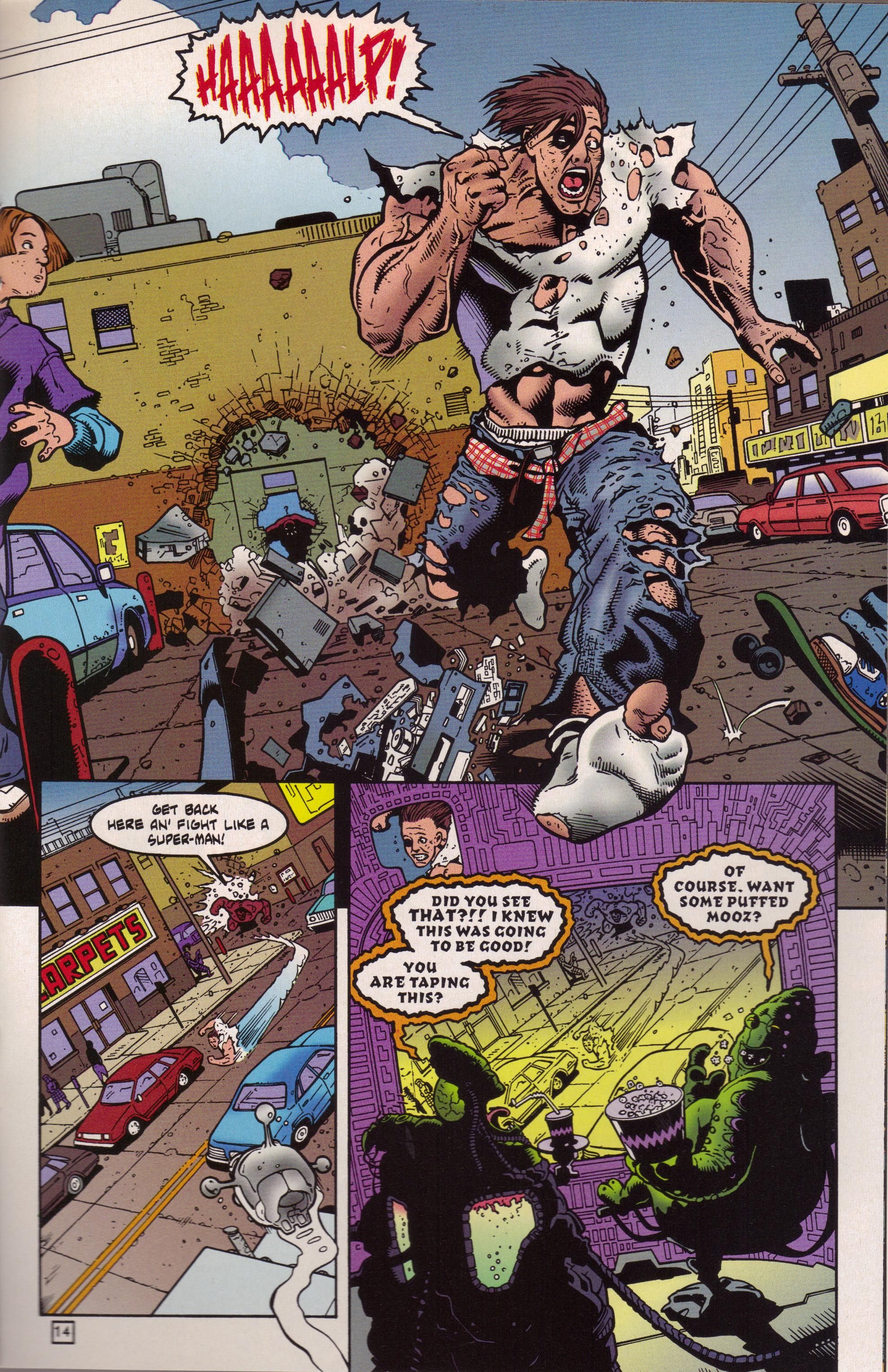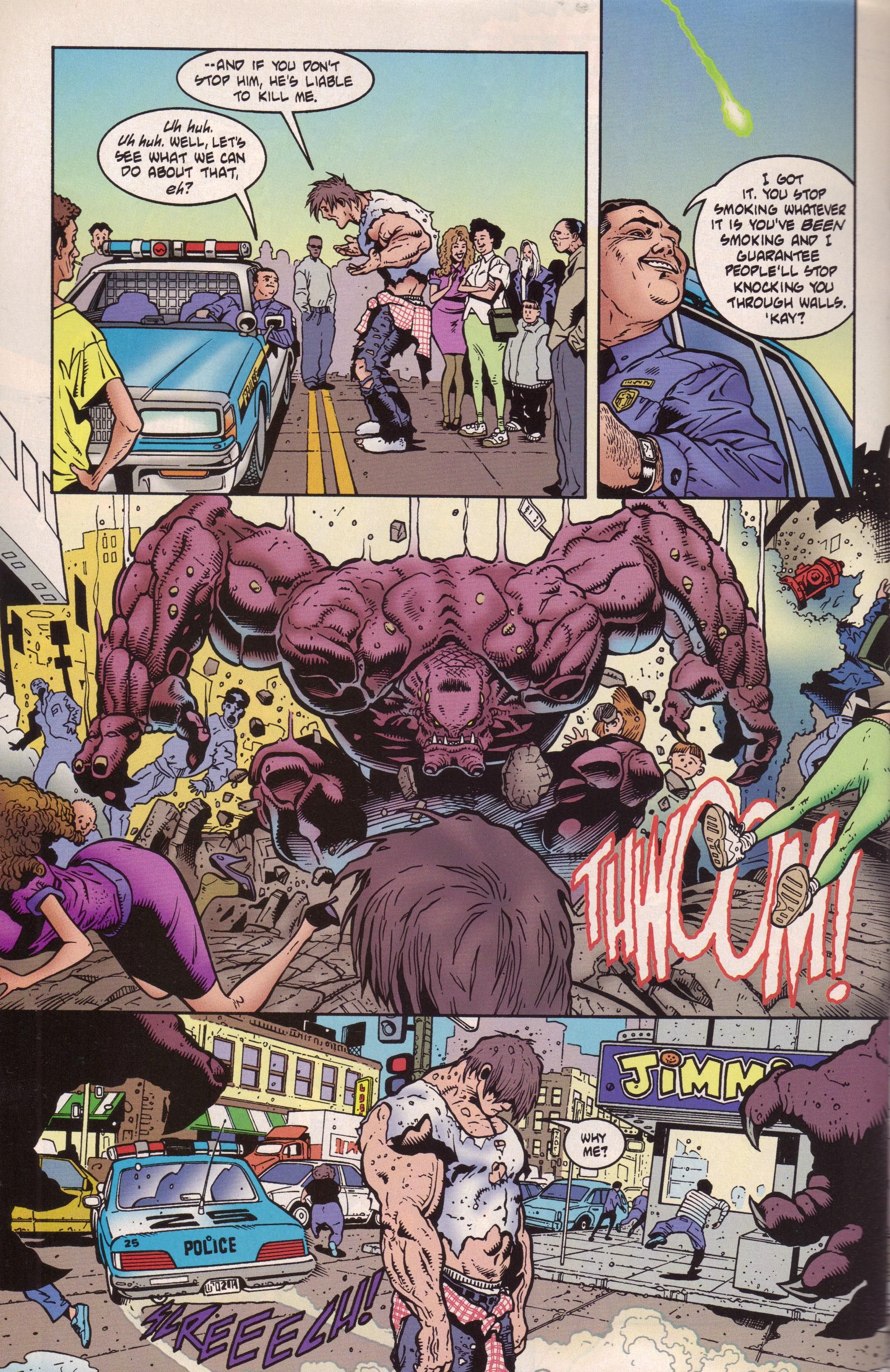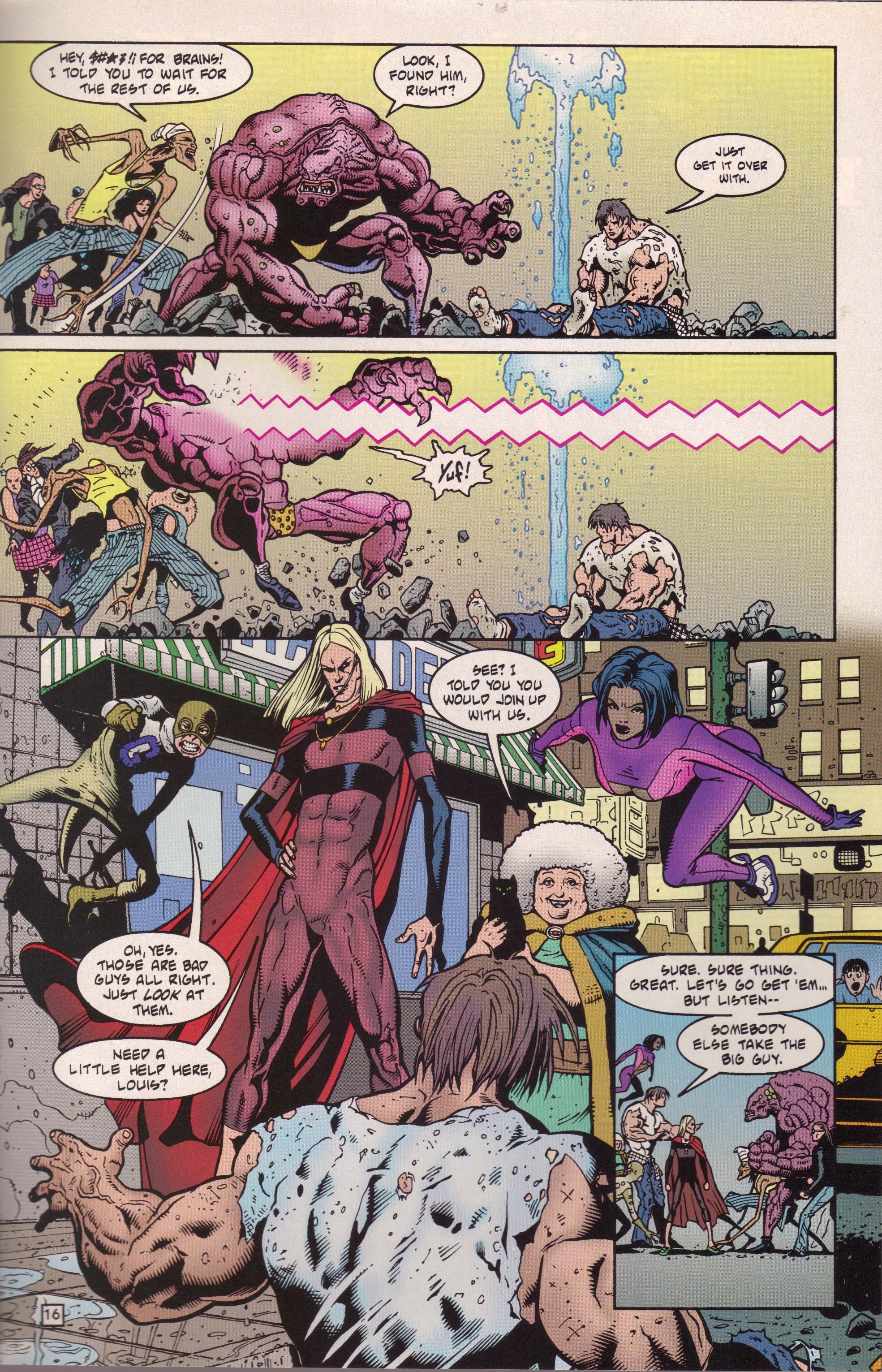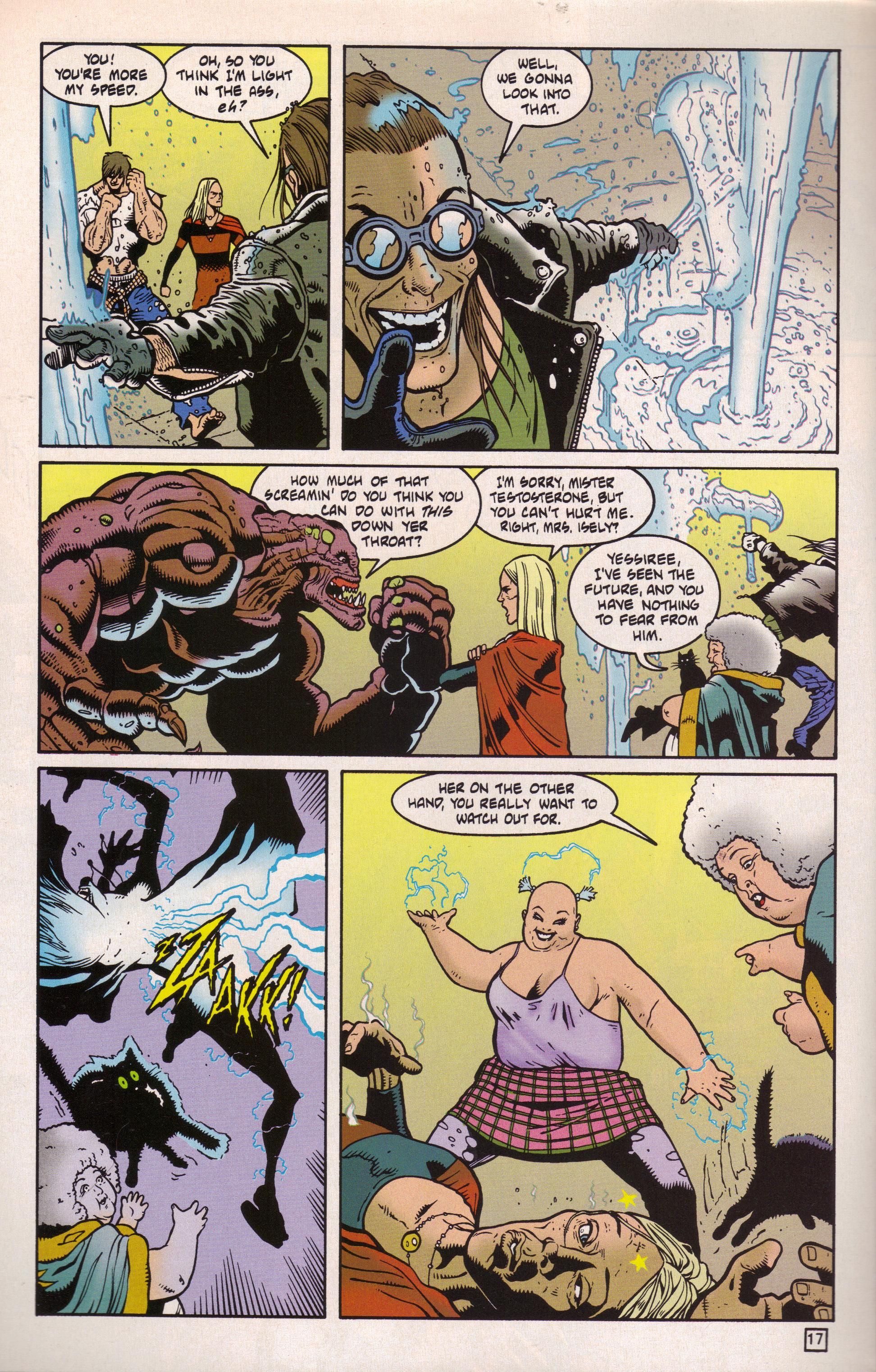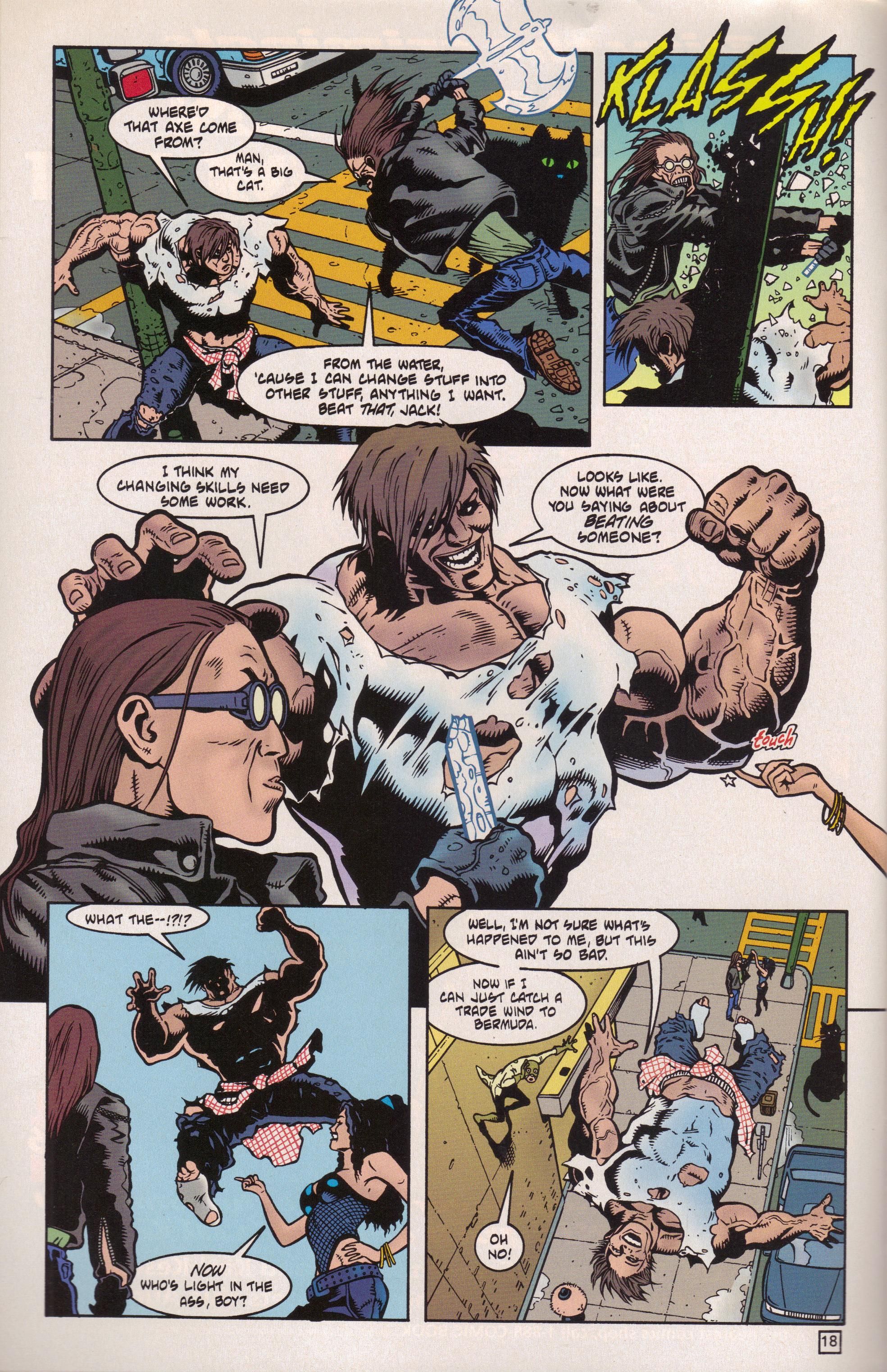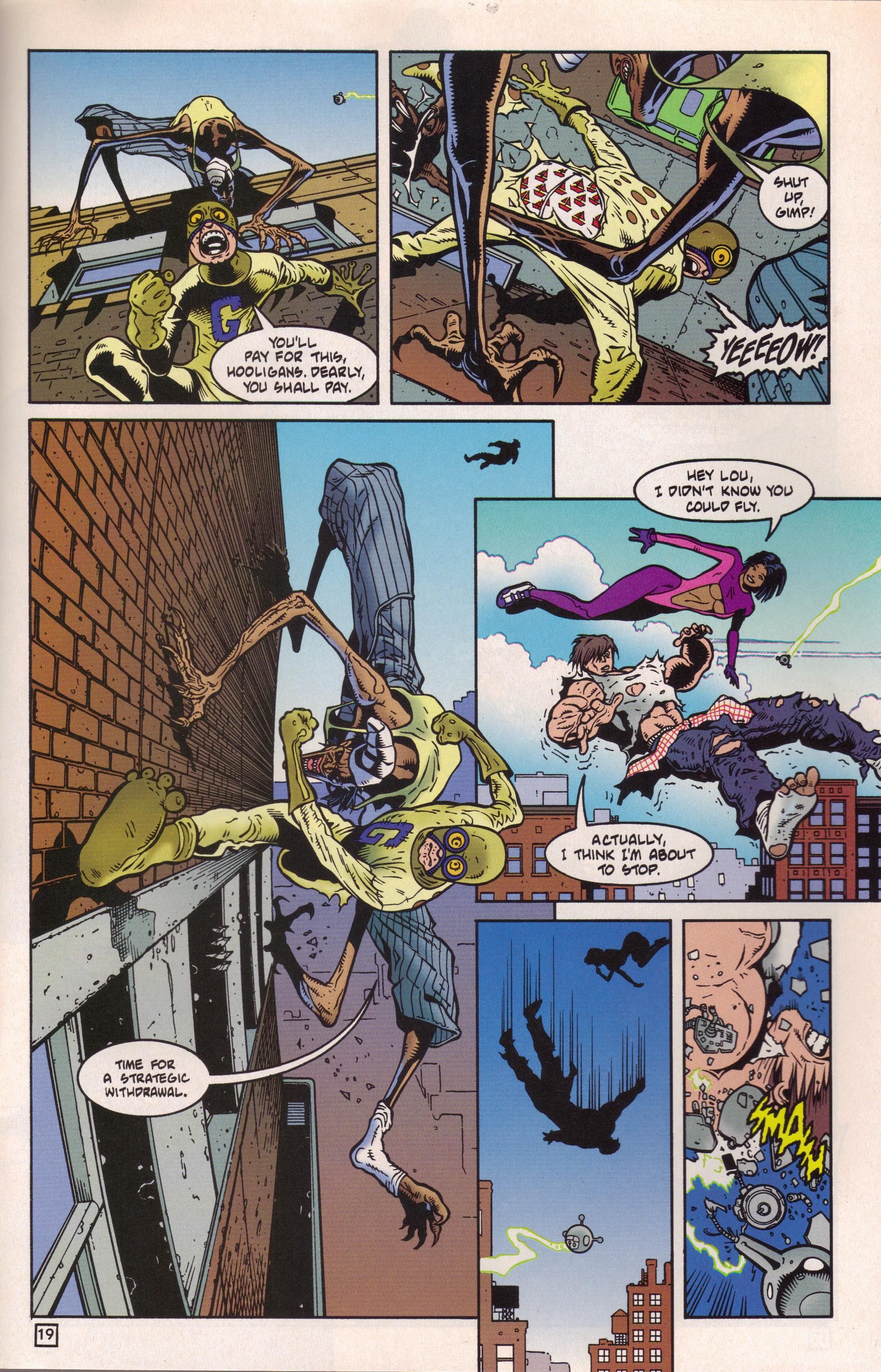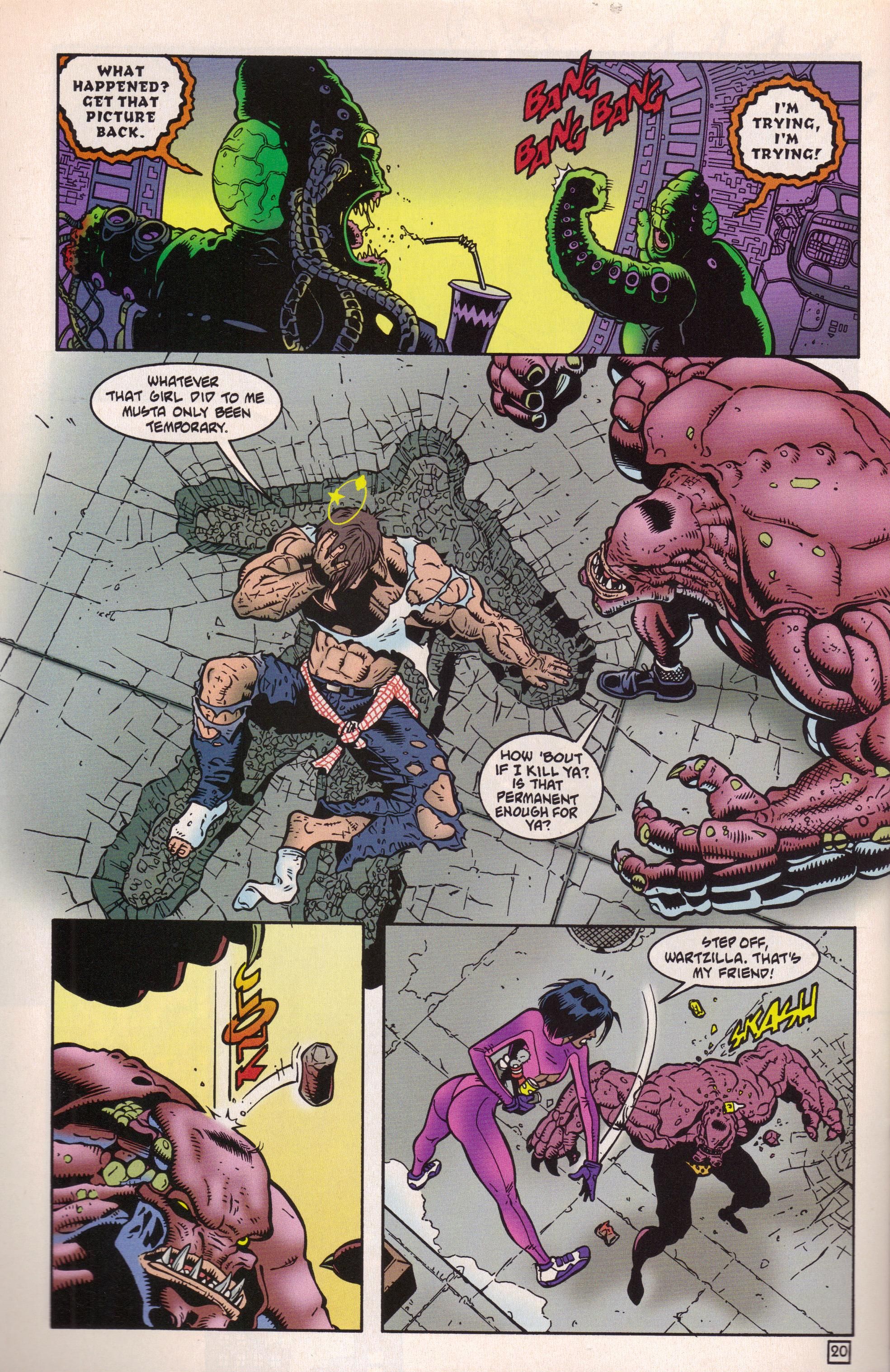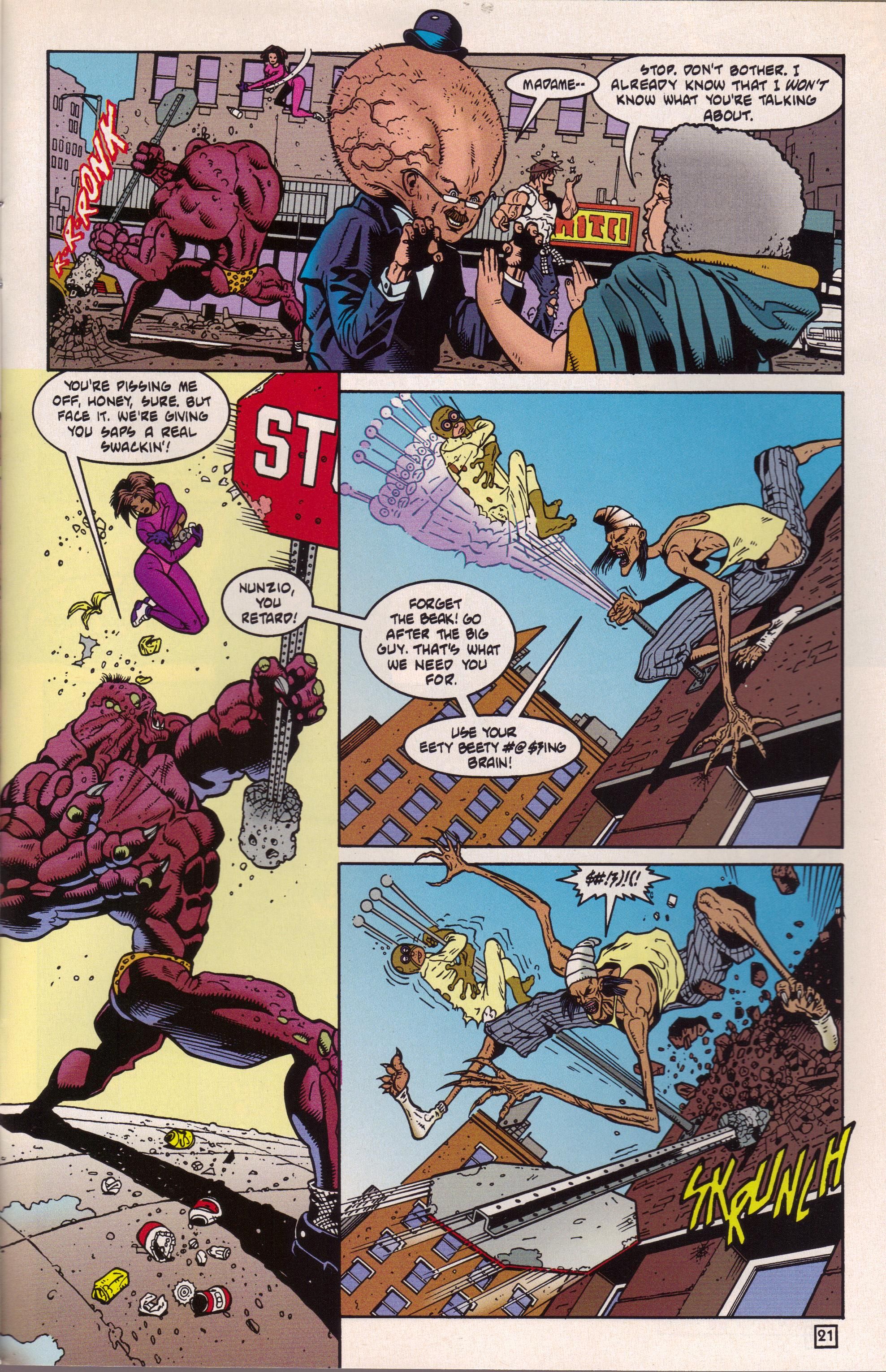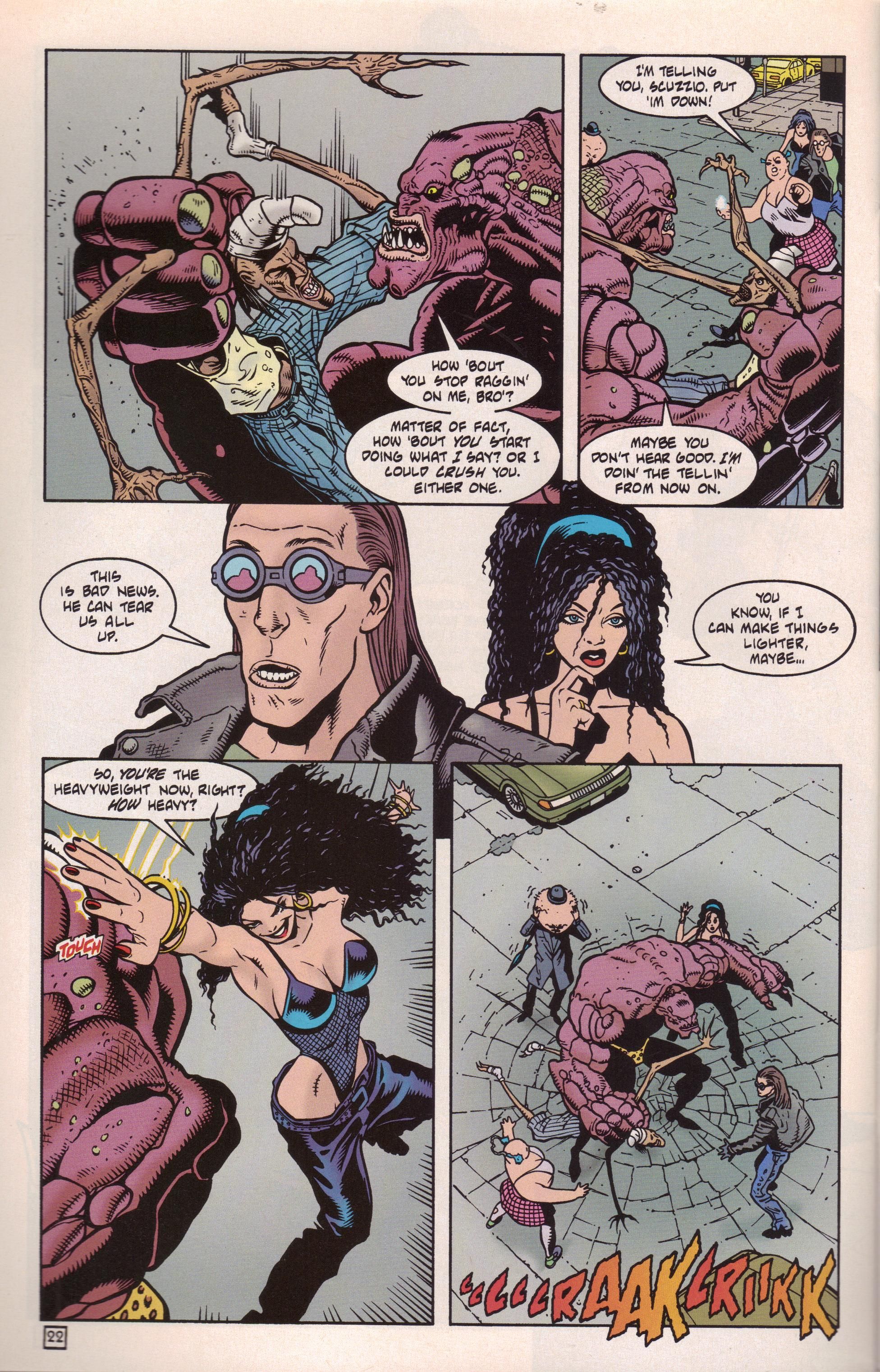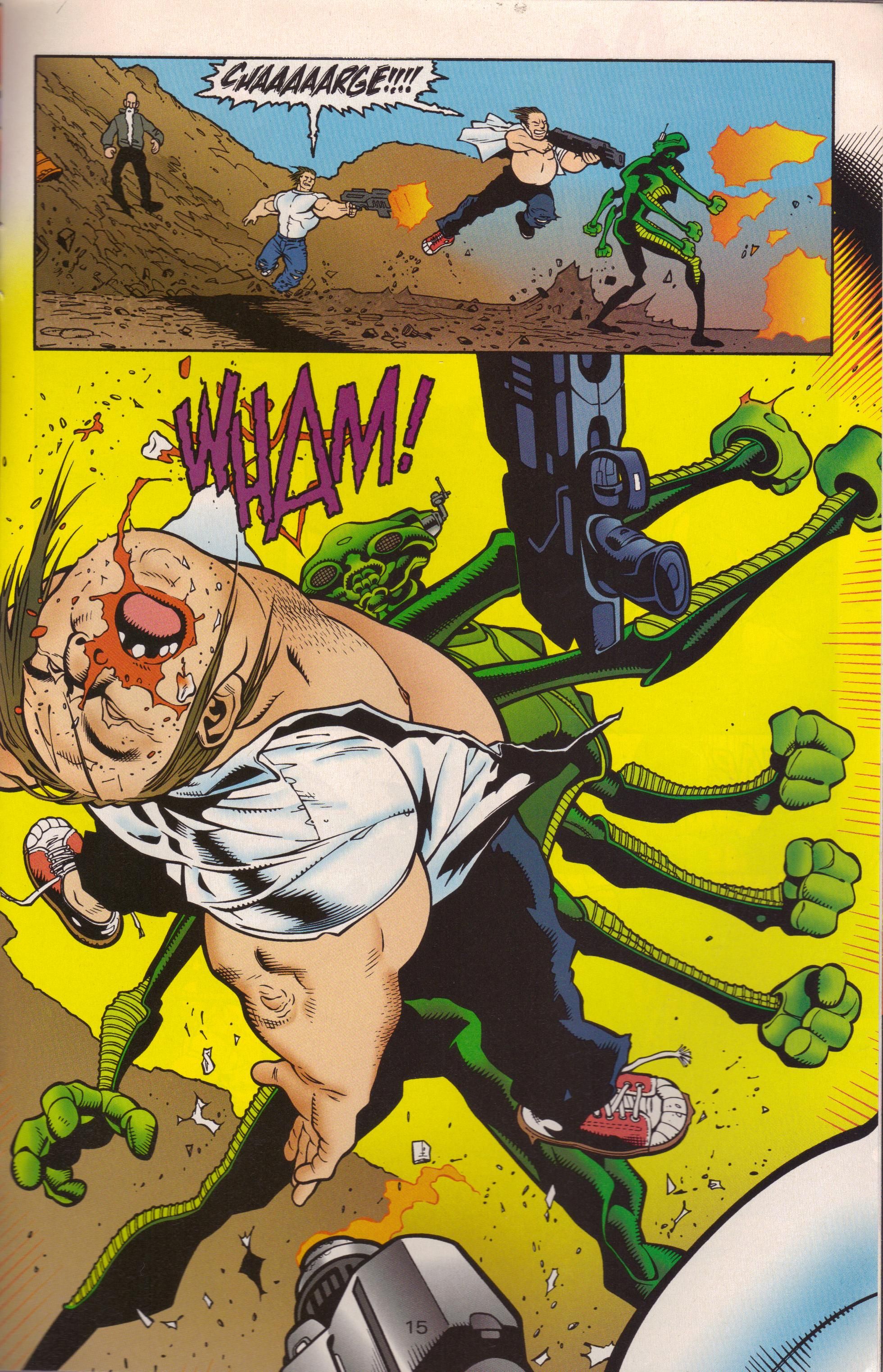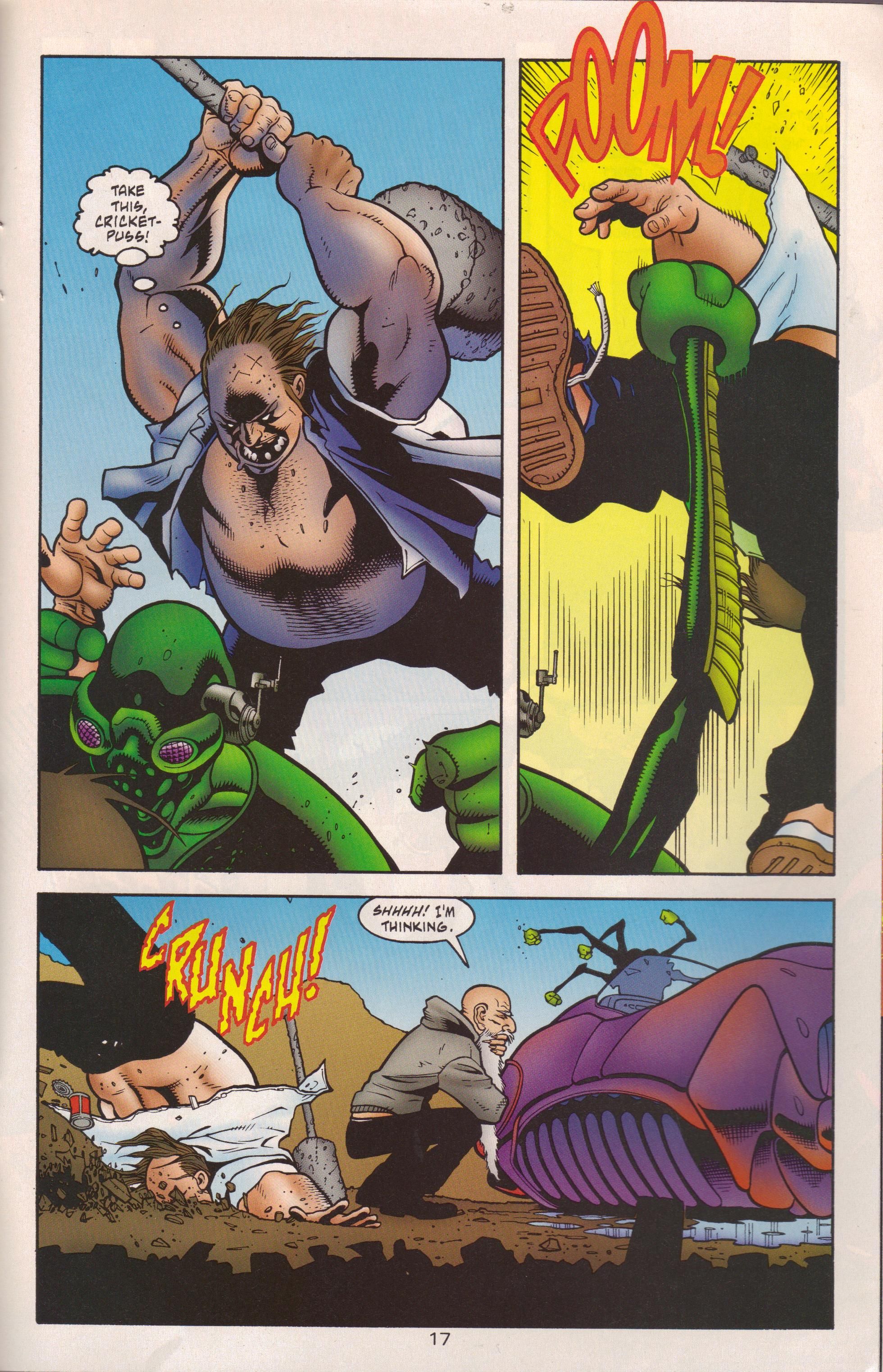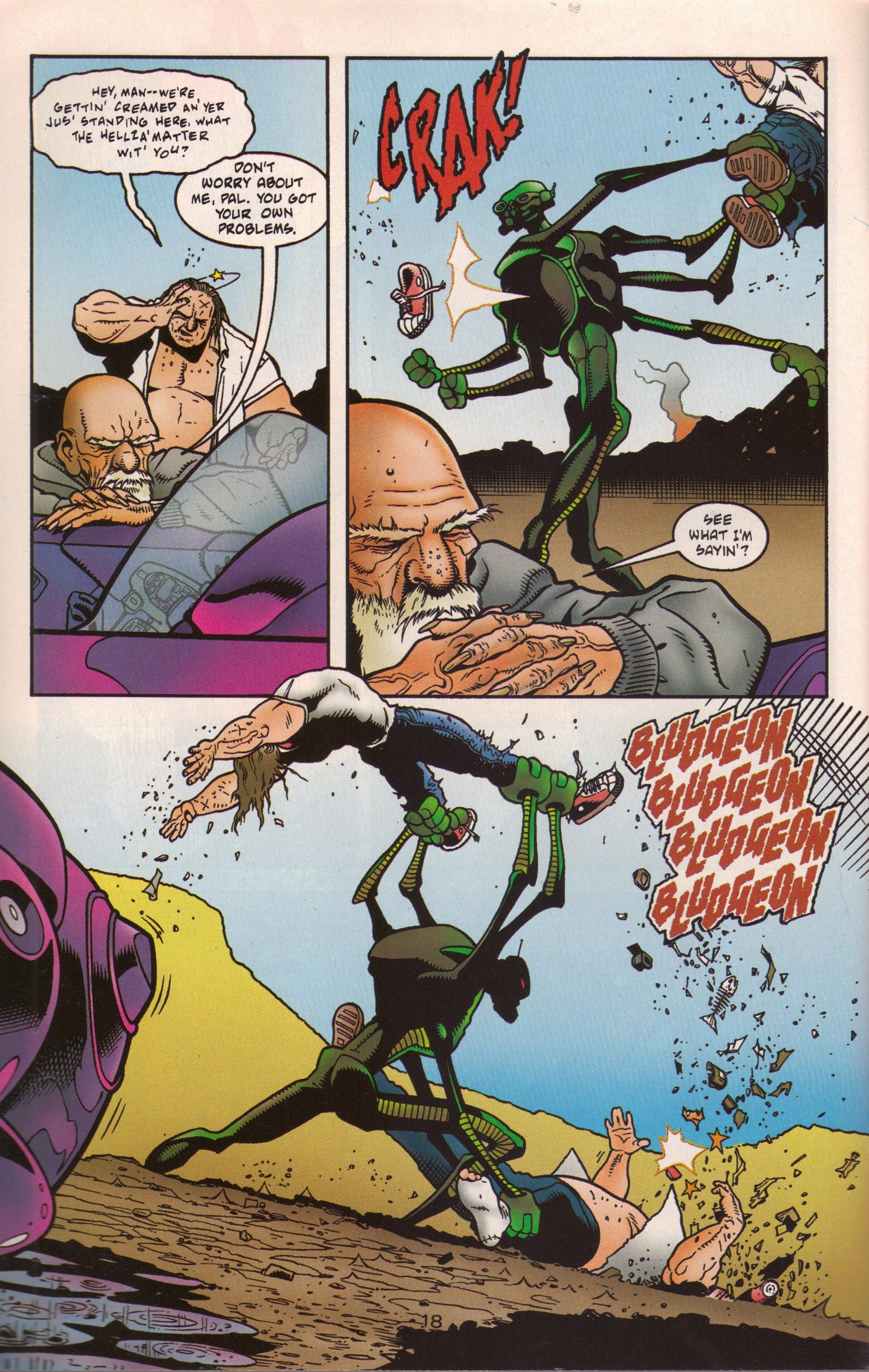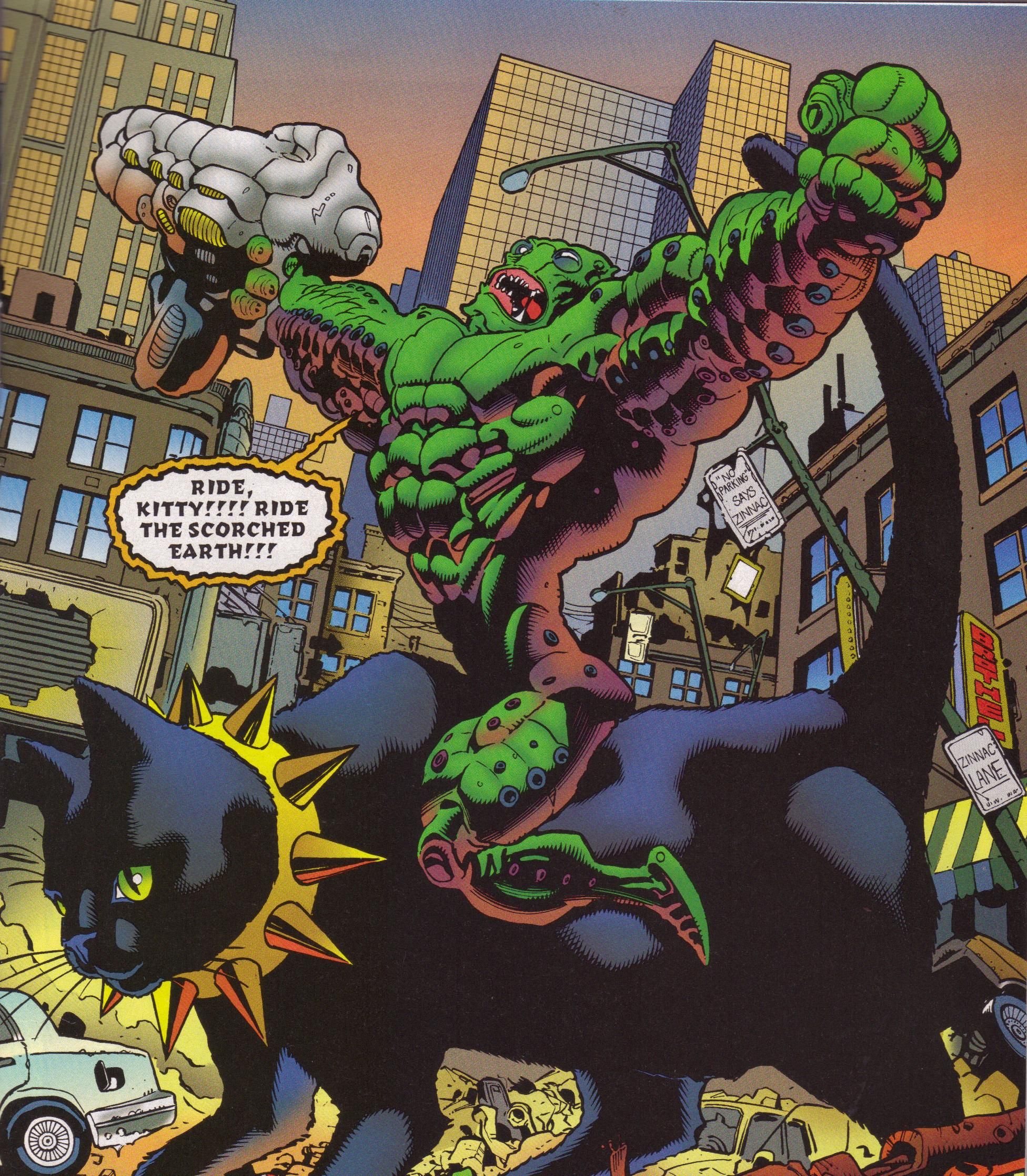Sigh. Another series that was too cool to live. But those often make great comics, because the creators can go all out!
Major Bummer by John Arcudi (writer), Doug Mahnke (penciller), Tom Nguyen (inker), Carla Feeny (colorist), Jamison (color separator) and Willie Schubert (letterer).
DC, 15 issues (#1-15), cover dated August 1997 - October 1998.
Minor SPOILERS, I guess. There's not much to spoil though, is there?
Back in the summer of 1997, 26-year-old me bought Major Bummer #1 but didn't continue buying it. Why 26-year-old me didn't keep buying it is one of the mysteries of the past, like why anyone thought leg warmers were cool or why Double Rush didn't become a huge hit (Double Rush was the bomb!!!!!). A few years later, I re-read issue #1 and thought, "You know, this is pretty good."
So I made it my great mission in life to hunt down the 14 subsequent issues. Yes, MY MISSION IN LIFE!!!!!!! And boy howdy, they didn't disappoint. Now it should be your mission in life to find this title!
Major Bummer was Arcudi and Mahnke's first big-time comic, and it shows. They obviously didn't know that in order to succeed at DC, you need to make as bland a project as possible, and make sure Batman guest-stars in the first five issues or so. Major Bummer doesn't even appear to take place in the regular DCU! I mean, come on, gentlemen! That's just not cricket! What we get instead is an oddball series with a protagonist who is, quite possibly, the worst "hero" ever to appear in a mainstream superhero comic. Lou Martin doesn't want to do anything except sit around and play video games all day. Even as the series moves along and it reaches a point where some creators might take their initially unsympathetic character in a more heroic direction, Arcudi resists until the very end, with the last two panels of the book showing Lou trying to sleep and ignoring his superhero brethren who want him to come out on patrol, and an elder Lou (the final story involves time travel) watching Abbott and Costello. Lou is livin' the dream!
Before we consider Arcudi's sharply satirical script, we should check out Mahnke's amazing pencil work, as Mahnke, it can be argued, has become a bigger star than Arcudi has.
Mahnke drew every single issue, and given his hyper-detailed line work, it's fairly impressive (also impressive: both Nguyen and Feeny kept up with him). Here and there a page will look rushed, but issue #15 looks as polished and intricate as issue #1. Mahnke, obviously, has a great deal of the "Image style" in him at this stage of his career, but some things lift it above the pack: The wildly disproportionate characters he draws here are completely satirical, and just by looking at the art, you can tell that Mahnke can, you know, draw. Almost everyone in this comic wears street clothes, and while superhero costumes are easy to get right, street clothes are a bit more difficult. And many of the characters actually change clothes throughout the run, too, which is always nice to see. Even the superhero costumes that Lou's allies wear show that Mahnke knows what he's doing - the Gecko's is ill-fitting, saggy, and obviously homemade; Lauren's is not really a costume, just clothes with a cloak thrown over them; Francis wears a sleeker leotard; and Val's at least looks like a superhero's outfit (complete with the ridiculous hole in the front), but her father is rich and spoils her rotten, so it's not surprising she'd have one. Lou wears similar clothing throughout the series, but even he changes shirts every so often. Even though Mahnke is parodying fashion in the 1990s (Nancy's bizarre fishnet body stocking and gravity-defying sagging jeans, for instance), the people dress in regular and, more importantly, diverse clothing, which is oddly difficult for many superhero artists to pull off.
Mahnke's designs are wonderful, too. The three principal young ladies in the book are all, unsurprisingly, hotties, but Mahnke gives them curves and not just gigantic breasts. Plus, they're different kinds of people - Marnie is a white blonde, Val is a dark-skinned, dark-haired young lady, and Nancy is a weird amalgam of gangster and Goth. Mahnke gives each of them personality with his designs and their fashion sense - Marnie is much more casual than Val, for instance, who remains a Daddy's girl even though she's lusting after Lou.
The others in the book are well done, too. Francis is a skinny geek, Lauren is maternal, the Gecko slouches as an outward sign of his insecurity, Milton is a wild caricature of every comic book nerd ever, and even someone like Bridget, the large gangster girl who gets electric powers, isn't designed as a joke - yes, she's a big girl, but she revels in her sexiness as much as the thin ladies do. The variety of body types and characters in this book make it far more interesting to look at than a normal superhero book.
Of course, Mahnke's design sense extends to the many other creatures in the book as well as the frenetic action sequences. His aliens are just humanoid forms, but they have a lot of flair. Of course, issue #5 brings us Tyrannosaurus Reich, the Nazi dinosaur from another dimension, who is pretty danged keen. Nunzio, the bad guy who changes form in issue #3, is another ridiculously over-the-top creation, with grossly exaggerated arms and torso and spindly legs by comparison. The demon in issue #8 is another wild thing from Mahnke's fevered imagination, with a top knot of dreadlocks and a lower jaw that juts out further than his upper one. It's a fantastic book to look at because Mahnke makes everyone unique and wild. And, of course, there's the way he lays out a page and choreographs the action, which is often breathtaking. Mahnke smashes panel borders, gives us huge panels that almost explode off the page, and some bizarre camera angles that make the action even more frenetic. As it's difficult to really get across the effect of what Mahnke does, I figured I would just post a sequence from issue #3:
And, just to show that Mahnke didn't slow down at the end and could handle doing 15 issues in a row, here's a sequence from the final issue (including the panel where the alien beats Lou with another version of Lou - it's the whole time travel thing, so you just have to go with it):
Mahnke's wonderful art is in service to a wild story by Arcudi. The set-up is ripped straight from a cheesy sci-fi movie - slacker opens a package and gets huge, strong, and tougher (but certainly not invulnerable) - but Arcudi makes it work (and, of course, this is similar to The Mask, the first Arcudi/Mahnke collaboration).
We're introduced to his "hero," Lou Martin, when he's pulling speakers out of his car to hook up to his video games to make them louder. This is the kind of dude Lou is. A package mysteriously appears on his front stoop that, when he opens it, knocks him unconscious for two days and makes him huge - a fact that escapes his notice for a good portion of the day, because he's so oblivious. He meets other people with powers - Lauren Isely, who can see the future; Francis Dutton, who has a supersonic scream; the Gecko, who can stick to walls; and Val Andrist, who flies (there's also the cat that can grow to gigantic sizes, which got its power by mistake). They want Lou to be the leader of their own supergroup, but he's not interested. We learn in issue #2 that aliens were behind his transformation. They were taking a college class and decided to experiment on humans by sending some of them "extreme enhancement modules" and turning them into superhumans. But they sent Lou's to the wrong person - Yoof, the dumb alien, didn't realize that the phone book printed last names first, so instead of sending the E. E. M. to Martin Lewis - a fine, upstanding law student/school teacher, they sent it to Lou Martin, all-around slacker (and yes, I'm aware of the joke with the names of a certain famous comedy team, but Arcudi doesn't make a big deal about it, so I won't). They also explain that the E. E. M. is a kind of "danger magnet," so he can expect all sorts of weird things to happen around him, as the experiment is to see how those enhanced people will deal with it. Unfortunately, Lou has to keep the E. E. M., because it grafts to the subject's heart and can't be removed. This is the basic set-up - Lou doesn't want this thing, the aliens hang around making life difficult for him, the others want Lou to be their leader, and a small gang of punks also get E. E. M.s so that Lou will have a challenge to face.
Arcudi simply chucks stuff at us and hopes it works, and because of the strength of his character work, it does. Lou's an interesting case - Arcudi simply never lets him be a hero. He's not a complete jerk, he just wants to be left alone so he can play video games all day.
Of course, this series parodies all the various superhero books where either someone selfish becomes superpowered and decides to become a good person (Peter Parker wasn't a tool before he became Spider-Man, but he was selfish until his uncle was killed) or of an earnest weakling who desperately wants to be a superhero to help people (Steve Rogers is the ur-example of this), and what makes this a great parody is that Arcudi never changes the tone. In the final story, when Lauren travels to the future to convince Lou to change the past, the older Lou is as much of a slacker as the younger Lou, and only even older Lou yelling at him gets him to fight the bad guy who caused time to go nuts. And, as I wrote above, the final page shows Lou trying to sleep even though it's close to noon while his superpowered friends try to wake him up. Despite being really strong and tough, Lou usually runs away from trouble and whines when he has to actually fight. He runs away from Nunzio in issue #3 and doesn't actually do any fighting when all the principals get together to bash each other; he ignores the weird sentient trash in issue #4, except for stomping on a few random beasties; he does nothing against Nunzio in issue #6 (Milton, the nerd who worships him, actually does all the work); he hits the demon in issue #8 but also runs from it; he kills Nunzio by accident in issue #9; he defeats a revived Nunzio in issue #10 after running away and trying to get the aliens to solve things; he doesn't even win in issue #11, as that's the issue in which he gets killed (it's all explained, though), and in issue #12, he only hits the bad guy because he's really angry. The few times he beats the bad guy, he outthinks him, which is Arcudi's sly comment on Lou himself - even though he's been buffed out, he's still a nerd who knows how to adapt his car speakers for his video-game system, and that doesn't change. The E. E. M. makes him smarter, but his intelligence is in his unconscious and he can only access it when he's not trying too hard to do so. But he still uses his brains - he doesn't fight Tyrannosaurus Reich not because he's a coward (although no doubt he would have run from the Nazi dinosaur like he runs from every other bad guy) but because he's trying to fix the anti-matter hole that Yoof accidentally caused and through which the dinosaur came. Lou saves the day even though he doesn't know about it. In issue #8, he defeats the demon not by brawn but by his compassion.
And when he finally defeats Nunzio in issue #10, it's again by using his brains. The oldest Lou in issue #15 also uses his brains to defeat the time-traveling alien.
Arcudi does this to subvert our expectations with regard to superhero books. We expect Lou to punch things because of his bulk, but he rarely does so. He hits bad guys every once in a while, but it's often when he's been pushed to anger or in order to distract them so he can run away. It's refreshingly callous of Lou to let others do the heavy lifting, as Francis, the Gecko, and Val often fight much harder than he does (although even Val often flies away from danger). You might want to dislike Lou, but that's kind of the point - what would many people do if they got superpowers? Would they become heroes? Or would they just want to be left alone? Lou continues to try to live a "normal" life, but Arcudi doesn't let him, and that's where the fun of the book comes from.
Major Bummer is a comedy, of course, and its genius is in the fact that Arcudi's comedy comes from good characterization and impeccable comic timing and not from jokes, which can be hit or miss. The best comedy comics give us strong if odd characters and allow them to play off each other, and that's no different here. Arcudi not only runs the gamut of all possibilities of what can happen when people get superpowers (from the Gecko being accused of molesting children after he saves one from being run over to Francis trying to take advantage of his fame and failing spectacularly), he also writes these characters with distinct voices and shows them, warts and all, as realistically as possible, whence the humor springs. It's not sitcom snappy dialogue, but it is a bit heightened for humorous effect. Arcudi also recognizes some of the offbeat things about American culture and plays with those, too. The most minor of these is the fact that Yoof doesn't know the phone book lists surnames first, but that's just one of the little jokes sprinkled throughout that stem from a specific culture - that of America in the late 20th century. It might date the book just a bit (there's a Spice Girls reference, for instance), but not too much. Arcudi also toys with stereotypes nicely - the punks are certainly punks, but they're also more interesting than generic street toughs, while Milton, a typical comic book nerd, crosses the line into craziness to feed his obsession.
Arcudi also, surprisingly, grounds the book in enough real life to make it even funnier. The characters have money issues, which leads to Francis taking a job for a extermination business (humorously named "Roach Smokers") and Lou working at an ice cream parlor. The Gecko gets arrested for child molestation, which isn't funny, of course, but as we know he's innocent, it allows Arcudi to re-introduce Martin Lewis, who helps him get out of the charges and inspires him to make "big changes" in his life (a joke that pays off a few issues later - Arcudi isn't afraid of the slow burn). When Nunzio revives and attacks Lou, the prosecutor quickly shifts to Lou's side and tells him to kill Nunzio again. There are many, many little touches like that in the book, which keeps it lively and hilarious. Arcudi doesn't completely go the humorous route, another way the comedic parts of the book stand out. Lou makes some very good points about interfering with professionals who are trained to rescue people. Again, keeping things just a touch "realistic" helps the wacky parts stand out much more and makes the entire book more interesting.
Mainly, this is simply a wildly fun comic of the kind that comes along every once in a while and which usually dies a quick death. Some of these are great, some are only decent, some are terrible, but the creators are at least trying to bring the fun back into funny books. When you have a team as excellent as Arcudi and Mahnke (I should point out that Nguyen's inks and Feeny's colors are wonderful as well, and although I would put Schubert on a list of worst letterers ever, his work here isn't as bad as it is in other places), you get a grand experiment that pokes fun (with love) at every superhero trope yet still tells some cracking good stories. Mahnke's dynamic art is a pleasure to gaze at, and it's fun to read Arcudi's scripts more than once and see how everything holds together. The two creators put so many wonderful details into the book (who doesn't love the dinosaur wearing the chef's hat covered with swastikas?) that it's fun to page through it randomly picking them up.
Arcudi has never become a huge star, but he's always done solid work (and his latest, A God Somewhere, is very good - check it out!), while Mahnke has ascended higher up the comics hierarchy by smoothing out his lines a bit to make it look more "mainstream" while retaining the ability to go nuts - witness his work on Frankenstein during the "Seven Soldiers" epic. Major Bummer, however, remains a pinnacle of their work. In case you haven't been paying attention to DC's horrible policy of collecting comics, this has NOT gotten even one trade paperback, but I found most of the issues fairly easily and for cover price (and I wasn't even looking that hard; I'm sure you can find them cheaper than that). You will not be disappointed if you seek the series out. Don't you want more joy in your life?
The archives - almost back from the dead! So exciting!


